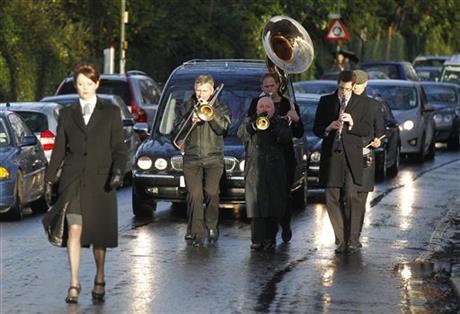
By JILL LAWLESS
A band leads the coffin of great train robber Ronnie Biggs into Golders Green Crematorium in London, Friday, Jan. 3, 2014. The world renowned robber Biggs who gained notoriety for spending 36 years on the run after escaping prison, died last month at the age of 84. (AP Photo/Sang Tan)
Britain Ronnie Biggs Funeral
Mourners carry the coffin of great train robber Ronnie Biggs into the chapel at Golders Green Crematorium in London, Friday Jan. 3, 2014. Biggs was a member of a gang that stole 2.6 million pounds from a Glasgow-to-London mail train in August 1963, in what was called the “heist of the century.” He spent decades in exile in Brazil before agreeing to return to Britain, and prison, in 2001. (AP Photo/Sang Tan)
Britain Ronnie Biggs Funeral
Mourners carry the coffin of great train robber Ronnie Biggs into the chapel at Golders Green Crematorium in London, Friday Jan. 3, 2014. Biggs was a member of a gang that stole 2.6 million pounds from a Glasgow-to-London mail train in August 1963, in what was called the “heist of the century.” He spent decades in exile in Brazil before agreeing to return to Britain, and prison, in 2001. (AP Photo/Sang Tan)
Britain Ronnie Biggs Funeral
Mourners carry the coffin of great train robber Ronnie Biggs into the chapel at Golders Green Crematorium in London, Friday Jan. 3, 2014. Biggs was a member of a gang that stole 2.6 million pounds from a Glasgow-to-London mail train in August 1963, in what was called the “heist of the century.” He spent decades in exile in Brazil before agreeing to return to Britain, and prison, in 2001. (AP Photo/Sang Tan)
Prev 1 of 4 Next
LONDON (AP) — Defiant to the end, British train robber Ronnie Biggs was laid to rest Friday at a funeral complete with a Dixieland band, an honor guard of Hells Angels and a cheeky floral tribute.
A hearse carrying Biggs, who died last month at age 84, was escorted by 13 bikers to London’s Golders Green Crematorium.
The hearse bore a white floral wreath in the shape of a rude two-fingered salute, and a coffin draped in the flags of Britain and of Brazil, where Biggs lived for three decades and where he was transformed from fugitive into folk hero.
The coffin was brought into the packed chapel to the strains of the London Dixieland Jazz Band.
“People have asked me ‘How can you take part in the funeral of a Great Train Robber?'” said Rev. Dave Thompson, who led the funeral service. “What we need to remember is that Jesus didn’t hang out with hoity-toity folk, he just treated people as people.”
Biggs was part of a gang that pulled off the 1963 “Great Train Robbery” of a cash-packed Glasgow-to-London mail train.
The heist netted 1.6 million pounds — $7.3 million at the time, or more than $60 million today — but most of the gang members were soon arrested.
Biggs was jailed but escaped from London’s Wandsworth Prison and made his way to Brazil. He lived in Rio de Janeiro for more than 30 years — regaling journalists and tourists with his story, recording with the Sex Pistols and selling commemorative T-shirts — before returning voluntarily to Britain, and prison, in 2001.
Elderly and in failing health, Biggs was released in 2009 on compassionate grounds.
To the end, he said he hoped to be remembered as a lovable rogue — though that label was rejected by some, including the widow of the mail train’s driver, who was injured in the robbery and never fully recovered.
Biggs’ Brazil-born son Michael remembered his father as someone who “always had a soft spot for the underdog and he considered himself to be one.”
“Dad never made enemies and after arriving in Brazil he embraced the culture and became a carioca, someone from Rio,” Michael Biggs said.
“Let’s celebrate his life with a proper booze-up later on, ashes to ashes and dust to the beach,” he added. He offered a promise to his father: “Don’t worry, mate — you are not paying for the booze.”



